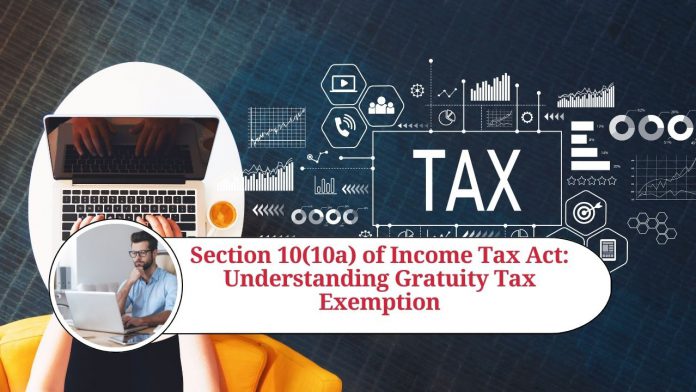Section 10(10a) of the Income Tax Act, 1961 provides a tax exemption on the death-cum-retirement gratuity received by employees. A gratuity is a monetary benefit that is paid to an employee as a token of appreciation for their services rendered to an organization. It is usually paid at the time of retirement or resignation.
Exemption Limit:
The gratuity paid to employees is calculated based on their salary and the number of years they have served in the organization. According to Section 10(10a), any gratuity received by an employee on their retirement or death is exempt from tax up to a certain limit.
The exemption limit for gratuity is based on the employee’s length of service and the salary drawn. As per the Income Tax Act, the exemption limit for gratuity is calculated as follows:
15 days’ salary based on the last drawn salary for every completed year of service or part thereof in excess of six months.
For example, if an employee has served in an organization for 20 years and their last drawn salary was Rs.50,000 per month, the gratuity calculation would be as follows:
(15/26) x 50,000 x 20 = Rs.14,42,307
In this case, the employee would be eligible for a tax exemption of up to Rs.14,42,307 on their gratuity amount.
Conditions for Tax Exemption:
However, it is important to note that the tax exemption on gratuity is subject to certain conditions. For instance, the exemption is only available to employees who have completed at least five years of continuous service with the same employer. This condition is relaxed in cases of death or disablement of the employee. Additionally, the exemption is only available to employees of the government, local authorities, and other specified organizations. Private sector employees are not eligible for this exemption.
In case of death, the gratuity amount received by the legal heirs of the deceased employee is also exempt from tax up to the same limit. However, in such cases, the exemption limit is calculated based on the length of service of the deceased employee and their last drawn salary.
Tax Implications:
It is important to note that any gratuity received in excess of the exemption limit is taxable as per the income tax slab rate of the employee. Additionally, if an employee has received gratuity from more than one employer in a financial year, the exemption limit of Rs. 20 lakhs applies cumulatively to all such employers.
Read more useful content:
- section 234e of income tax act
- section 286 of income tax act
- section 90a of income tax act
- section 40a(7) of income tax act
- section 226(3) of income tax act
- section 24 of income tax act
frequently asked questions related to Section 10(10a) of the Income Tax Act:
Q: What is gratuity?
A: Gratuity is a monetary benefit paid by an employer to an employee as a token of appreciation for their services rendered to the organization. It is usually paid at the time of retirement or resignation.
Q: Who is eligible for the tax exemption on gratuity?
A: The tax exemption on gratuity is only available to employees of the government, local authorities, and other specified organizations who have completed at least five years of continuous service with the same employer. Private sector employees are not eligible for this exemption.
Q: What is the exemption limit for gratuity?
A: The exemption limit for gratuity is calculated as 15 days’ salary based on the last drawn salary for every completed year of service or part thereof in excess of six months. The maximum exemption limit is Rs. 20 lakhs.
Q: What happens if the gratuity amount received is more than the exemption limit?
A: Any gratuity received in excess of the exemption limit is taxable as per the income tax slab rate of the employee.
Q: What is the impact of receiving gratuity from multiple employers in a financial year?
A: If an employee has received gratuity from more than one employer in a financial year, the exemption limit of Rs. 20 lakhs applies cumulatively to all such employers.
Q: Is the gratuity amount received by legal heirs of a deceased employee exempt from tax?
A: Yes, the gratuity amount received by legal heirs of a deceased employee is also exempt from tax up to the same limit. However, in such cases, the exemption limit is calculated based on the length of service of the deceased employee and their last drawn salary.
Q: Can an employee claim the tax exemption on gratuity in their income tax return?
A: Yes, an employee can claim the tax exemption on gratuity in their income tax return by providing the necessary documentation to support their claim. It is important to ensure that the calculation of the exemption limit is accurate and supported by appropriate documentation




















